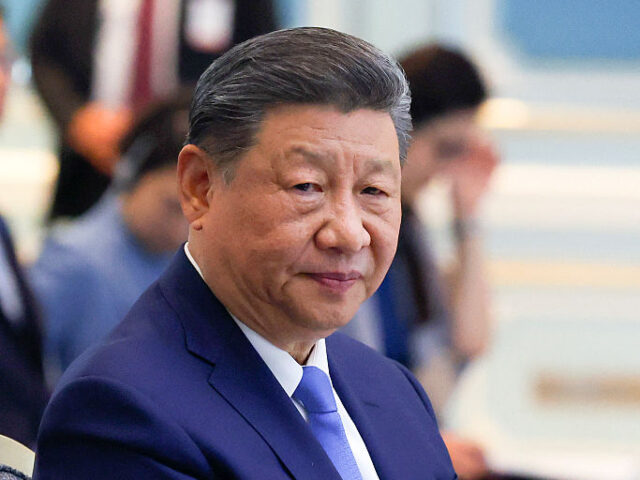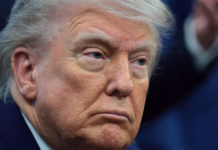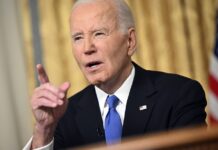The Chinese Ministry of Commerce warned countries around the world that “appeasement cannot bring peace, and compromise cannot be respected” in an ominous message on Monday apparently intended to have a chilling effect on global enthusiasm for renegotiating trade deals with the United States.
The Commerce Ministry’s statement was published as a response to a journalist asking for comment on President Donald Trump’s economic policy changes this month in which he announced reciprocal tariffs on nearly every country that trades with America, including China. Countries with the most unbalanced trade with the United States received the highest tariff rates, reaching as high as 50 percent for Lesotho, the most affected country, and near-50-percent rates for nations such as Madagascar and Vietnam. On this scale, China was imposed a 34-percent tariff in addition to tariffs Trump had initially announced on China in response to its facilitation of the illicit fentanyl trade.
Trump paused tariffs on every country except China for 90 days after his initial announcement on “Liberation Day,” April 2 and subsequently increased tariffs on Chinese imports to the United States.
“I will say this, virtually every country wants to negotiate. If I didn’t do what I did over the last couple of weeks, you wouldn’t have anybody who wants to negotiate,” Trump claimed on April 7. “Now, they’re offering things to us that we would’ve never even thought of asking them for.”
Last week, Trump held negotiations with Italian Prime Minister Giorgia Meloni and held conversations with the leaders of Japan and Mexico, which he praised as productive.
The tariffs on China currently stand at 145 percent and Trump has threatened a potential increase of up to 245 percent, arguing that America’s dependence on Chinese products is a threat to its national security.
The White House has explained that the limits on tariffs to other countries, compared to the steep rates on China, is a result of Beijing’s refusal to negotiate a fair trade deal. The Chinese Communist Party appears to have interpreted the improved negotiating situation of other countries as an attempt to unite the world to contain China’s economic power and, on Monday, suggested those who negotiate with Trump could face punishment from Beijing.
“Recently, the United States has abused tariffs on all trading partners under the banner of so-called ‘reciprocity’ while coercing all parties to start so-called ‘reciprocal tariff’ negotiations with it,” the Chinese Commerce Ministry noted in its statement on Monday. “Appeasement cannot bring peace, and compromise cannot be respected. To seek so-called exemptions by damaging the interests of others for one’s own temporary selfish interests is to seek the skin of a tiger, which will ultimately only fail on both ends and harm others and oneself.”
“China expects all parties to resolve their economic and trade differences with the United States through equal consultations,” the statement continued. “China believes that all parties should stand on the side of fairness and justice, on the side of historical correctness, and defend international economic and trade rules and the multilateral trading system on the issue of ‘reciprocal tariffs.”
The statement again threatened that “China firmly opposes any party reaching a deal at the expense of China’s interests. If this happens, China will never accept it and will resolutely take countermeasures in a reciprocal manner.”
The Ministry did not offer any examples of what sorts of “countermeasures” it was considering for affected countries or what an agreement “at the expense of China’s interests” would look like.
The Global Times, a Chinese state newspaper, reported on the statement on Monday, adding that the Commerce Ministry described the world as currently facing an “onslaught of unilateralism and protectionism” that no country could withstand without solidarity.
“China is willing to strengthen solidarity and coordination with all parties, join hands to deal with them, jointly resist unilateral bullying, safeguard their legitimate rights and interests, and defend international justice,” the statement concluded.
This statement followed a tour by genocidal Chinese dictator Xi Jinping of southeast Asia that included stops in Vietnam, Cambodia, and Malaysia. Xi had largely remained silent following Trump’s “Liberation Day” announcement before traveling to Vietnam. There, he and fellow communist leader To Lam signed multiple agreements, many tied to China’s Belt and Road debt trap scheme, to increase trade dependence on each other.
“Trade war and tariff war will produce no winner, and protectionism will lead nowhere,” Xi wrote in an op-ed published by Nhan Dan, one of Vietnam’s largest newspapers, addressed to the Vietnamese people. “Our two countries should resolutely safeguard the multilateral trading system, stable global industrial and supply chains, and an open and cooperative international environment.”
Xi’s presence in Vietnam was notable because the country was among the first to reach out to negotiate with Trump. The White House initially imposed a 46 percent tariff on Vietnam that was among those paused for 90 days. Vietnam sent a delegation to Washington on April 3, the day after the tariff announcement, led by Deputy Prime Minister Ho Duc Phoc to discuss a new agreement that would result in lower tariff rates. Trump also spoke to To Lam personally on the phone shortly after the announcement.
“Just had a very productive call with To Lam, General Secretary of the Communist Party of Vietnam, who told me that Vietnam wants to cut their Tariffs down to ZERO if they are able to make an agreement with the U.S.,” Trump announced on April 4. “I thanked him on behalf of our Country, and said I look forward to a meeting in the near future.”
While both communist countries, Vietnam has endured multiple trade disputes with China in the past. Hanoi imposed its own tariffs on the Chinese steel industry the same week that Trump’s “Liberation Day” tariffs were announced, intended to keep China from crowding out Vietnamese companies from the steel industry by “dumping” its excess product.
Trump mocked Xi’s visit to Vietnam last week, telling reporters the “lovely” and “wonderful” meeting was an attempt to undermine his policies.
“I don’t blame China. I don’t blame Vietnam. I don’t. I see they’re meeting today. Is that wonderful?” he asked reporters. “That’s a lovely meeting… like trying to figure out, ‘How do we screw the United States of America?’”
Follow Frances Martel on Facebook and Twitter.




